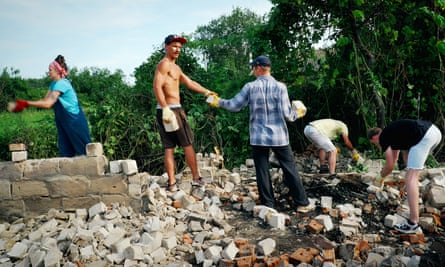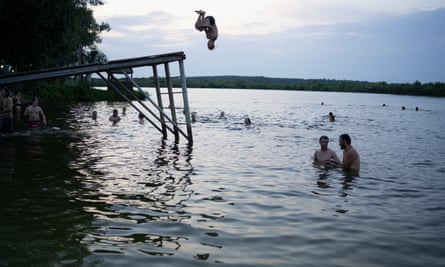“We are making a new Ukraine,” says Tetiana Burianova, as she surveys her volunteers clearing up a shattered house, part of a day’s reconstruction efforts in a war-ravaged village about 75 miles north-west of Kyiv.
While the government – fighting the war against Russia to the east and south – has struggled to clear and rebuild homes, the state’s absence has left a gap that Burianova and her fast-growing band of twenty- and thirtysomethings have begun to fill.

Every weekend during the hot summer months, Repair Together came out from the capital to help clear up the wreckage in villages that were briefly occupied by the Russians in the first few weeks of the war. The trips blend together vital work with socialising and a rare chance to have a weekend away.
“I want to thank the volunteers. I want to fall on my knees,” says Oleksii Oleksiiovych, a 63-year-old with striking blue eyes. His house was smashed to the ground during a tank battle in mid-March, forcing him and his wife to move in with neighbours. Any clean-up until now has been minimal.
In a matter of minutes, he and his wife, Tamara Leodinivna, lost everything they had accumulated over a lifetime: fridges, television, microwave, washing machine. “My wife and I have been married for a long time. We’ve earned everything ourselves. I had clothes burned out that I had never even worn before. All burned down,” he said.

As Oleksiiovych talks, one group of volunteers patiently takes apart the half broken structures that remain, while a second, more skilled, group surveys the levelled out brick base of the house with a view to rebuilding it – though it is unclear whether they have the resources to complete the task.
What began as a low-key effort in the early summer, Burianova says, has expanded to the point where about 200 urbanites, some arriving by a chartered coach, help clear up in villages where a need has been identified on scouting trips by fellow members of the group.
On this warm Saturday, the contrast between old and new is striking. Clearing up goes on around the severely damaged home of 86-year-old Liubov Pavlivna. Her disabled son Kolia was killed during the Russian occupation, lying dead in the house for five days, while at another point the invaders tried to evict her.
after newsletter promotion

“I was taken out and thrown to the riverbank,” Pavlivna says. “Russians threw me to the ditch and said: ‘Shoot this old lady!’ One of them said: ‘No. Let her stay alive.’ Then they left me and went away.” But although she is hard of hearing and has trouble walking, she refused to leave then and refuses to leave now as, finally, the rubbish in her home is removed.
Before the war, Burianova helped organise raves and trips abroad for young people. Now the trips she helps run include a lunchtime and evening cookout, the latter of which takes place on a bucolic campsite next to a lake, where the weather is warm enough for those inclined to dive in after a day of manual work.

But even allowing for the dance music playing as the sun sets, the trip is more than just a youthful get-together. Before the war, Burianova says, young people “would never come to these villages. But now we all take care of each other”.